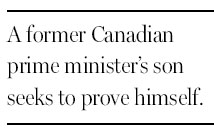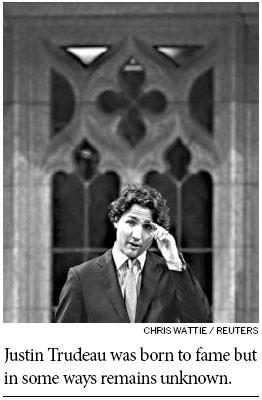For a noted name, success not certain
Updated: 2013-05-05 07:36
By Ian Austen(The New York Times)
|
|||||||||
MONTREAL - He is young, handsome, charismatic and married to a glamorous woman, and he draws overflow crowds at political rallies. He also carries the name of an earlier Canadian political figure who once fit the same description.
Justin Trudeau, 41, became the leader of the Liberal Party in April, 45 years and one week after his father, Pierre Elliott Trudeau, claimed a similar political victory. But the parallels between father and son may end there.

If he is to become prime minister like his father, Mr. Trudeau will have to grapple with a name that remains polarizing in Canada and show a skeptical public that he has his father's substance as well as his flash. He faces a country where political dynasties are rare and, at best, viewed with suspicion. And while his father led the Liberal Party at a high point of its fortunes, Mr. Trudeau will take over a much diminished version that fell into third place during the last federal election.
In his office above a pharmacy in the multiethnic section of Montreal that Mr. Trudeau represents in Parliament, he acknowledged that having the most famous name in modern Canadian politics was a blessing and a curse. But he repeatedly emphasized that he expected no special breaks because of it.
His father's intensely publicized marriage to the former Margaret Sinclair, the daughter of a retired cabinet minister, made Justin Trudeau a Canadian celebrity from the moment he was born, on Christmas in 1971. But Mr. Trudeau's public profile would rise and fade over the coming years. Even after a leadership campaign that began in the fall, many political analysts in Canada find that much still remains unknown about him.
Mr. Trudeau, wrote Aaron Wherry, a columnist for the magazine Maclean's, is "somehow both underestimated and overestimated, underqualified and best-suited, the personification of both nostalgia and the future."
As his parents' marriage crumbled - a widely distributed photograph showed Mrs. Trudeau partying at Studio 54 in New York while Mr. Trudeau was in the midst of an election campaign - Justin Trudeau and his two younger brothers moved in with their father in Ottawa.

His childhood, Mr. Trudeau said, was a mix of privilege and the plebeian.
A school bus picked him up each morning at the prime minister's official residence and took him to a public elementary school that drew its students from Ottawa's most affluent as well as one of its poorest neighborhoods.
"There were lunch hours where I wouldn't eat at school because we had to rush home to have lunch with the queen, for example, which actually happened," Mr. Trudeau said.
Mr. Trudeau studied English and French literature at McGill University and ended up in British Columbia, where he worked briefly as a snowboard instructor and nightclub bouncer. Eventually, he completed a teaching degree and taught French and math at two high schools in Vancouver.
Two deaths returned Mr. Trudeau to the public eye. In 1998, an avalanche in British Columbia killed his brother Michel. The resulting outpouring of public sympathy, Mr. Trudeau said, was unexpected by the family. The death, he added, shattered his father physically. Pierre Trudeau died two years later at 80.
When he entered politics himself in 2007, Mr. Trudeau, who is married to Sophie Gregoire, a former television host and model, chose an electoral district in Montreal with below-average incomes and traditionally high levels of support for Quebec separatism to show "that I wasn't taking anything for granted, and that I was willing to work for it."
Mr. Trudeau acknowledged that he would inevitably disappoint some of his supporters.
"Am I going to make mistakes? Loads of them," he said. "I'll be apologizing, I'll stumble through. But I trust my core, I trust my values and I trust Canadians. And if I blow it, it will really be because I wasn't up to the task."
The New York Times
(China Daily 05/05/2013 page10)